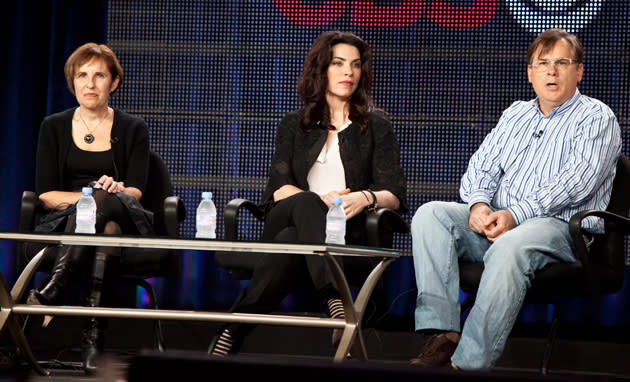Emmys: ‘The Good Wife’ creators aim to remain true to their characters

Robert King, co-creator of CBS' The Good Wife with wife Michelle King, called star Julianna Margulies' 2011 Emmy win for best actress in a drama series the highlight of their year. When you lose the Emmy competition, Robert jokes, "you dismiss the awards and say those don't matter anyway. And then when you win, it's 'damn right — everything's right with the universe.' Everybody understands art."
The series is already lobbying hard for another Emmy win in 2012. This year, TV Academy voters are receiving seven Good Wife episodes in their mailers, rather than the average 2-4 episodes sent by most network shows. "It's a nice problem to have, when you have so many good episodes," says CBS TV Studios president David Stapf. "And with the ability to send out more now, why not?"
The show's third season has brought good and not-so-good things to The Good Wife. On the good side: the Emmy for Margulies (co-star Archie Punjabi won in the supporting actress category in 2010) and the recent announcement that the show has been picked up for a fourth season by CBS. On the not-so-good side was the third-season move of the legal drama from Tuesday to Sunday nights, a choice that resulted in a disappointing ratings drop.
Stapf puts a positive spin on the situation, insisting that The Good Wife's affluent demographics make the show a valuable network commodity. And while acknowledging that "we'll always take ratings over awards," the executive points out that Good Wife's numbers only appear weak in comparison to other top-rated CBS drama fare including NCIS and the various CSI's. "I think a bit of [the Kings'] frustration is that in the landscape of CBS it isn't among the top, but in the landscape of network television, it does quite well," Stapf says. "They are still averaging 12 million viewers, which is quite a bit."
Robert King says that the demographic value of the Good Wife audience is reflected in their upscale advertisers, a list that includes Cartier. "I think we are valued at a different level," he says. Still, the producer adds, "The ratings themselves, we don't know what to do about it. We feel like with each show we work as hard as we can. Is there any way to do cable-ish stuff on network? Even at its height, Mad Men brings in 3½ million viewers."
Even with the ratings decline, CBS Entertainment president Nina Tassler called Sunday night a "good fit" for the show at the Television Critics Association's winter press tour in Pasadena at mid-season, adding: "The audience that watches on Sunday night is upscale, very female and very engaged." Stapf said he personally likes Sunday nights because of a perception of that evening as a "quality, vintage" TV night, featuring such stalwarts as 60 Minutes.
The Kings acknowledge that they preferred Tuesday to Sundays because story arcs are less likely to be interrupted by special programming and football overtime. "That's difficult for a serialized show," Michelle says. Still, the Kings' mandate is to worry more about story than scheduling. And this season, trying to remain true to their characters led the creators to pull a U-turn.
CBS launched The Good Wife's August move from Tuesday to Sunday with The Good Wife: A New Beginning, a half-hour, behind-the-scenes special that aired on Sunday, September 4. The promotional material included a steamy display ad featuring Margulies in black lingerie and the phrase: "Don't Let The Name Fool You." And the writers made good on a story line that got more than a hint in the previous season: Alicia Florrick finally went to bed with Will Gardner (Josh Charles), her superior at the law firm. But despite the lengthy buildup, the affair ended quickly.
Why? "One of the things we always felt we wanted to do this year was to show the natural progression of a love affair, a love affair that, in this case, she was having with her boss," Robert King says. "As much as you want to cheer on team Alicia/Will, there were a lot of reasons why it was morally corrupt. While we felt good about what it did for drama, I think it split the audience. I knew Julianna was getting [criticism]: 'Why not call it The Good Slut?' — Things like that."
Adds Michelle King, "We're never looking at it in terms of, 'how much sex should we put in, can we put in?' It's always very much about trying to be as honest about the characters as we can. What would Alicia truly do? That's really where it all starts."
In general, the Kings say, the network and studio leave them on their own to make those decisions. 'It feels kind of like they are throwing us the keys to the Ferrari and saying: 'Return it when you want, without scratching it up', " Robert says. "It's amazing how much freedom they give us. Our daughter doesn't give us that much freedom."
— Diane Haitman contributes to Deadline's TV coverage.
